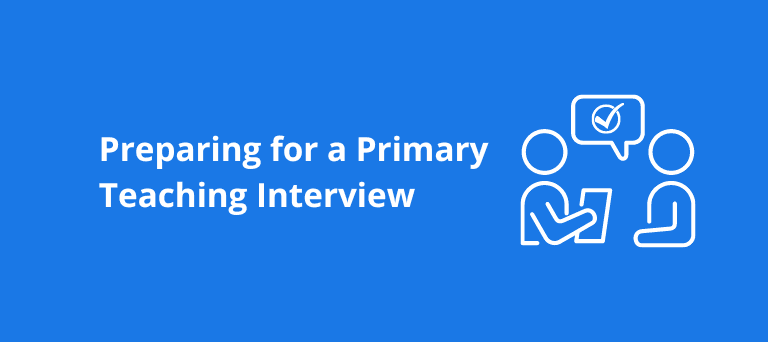Deborah A., Primary School Teacher
11 Jul 2023
5
min read

You have submitted an application for a primary teaching role, and now you are being called for a primary teaching interview. If you are like thousands of others reading this post, you already know that preparing for a primary teaching interview, especially as a first-timer, can be a nerve-racking experience.
Fortunately, we have created this guide to make preparing for your next primary teaching interview a breeze. In this guide, we'll cover some primary teaching interview tips and questions to help you increase your chances of landing the right role for you.
6 Tips for Preparing for a Primary Teaching Interview
Below are six tips on how to prepare for a primary teaching interview.
1. Research the School
Just as you would research the features of a car you want to buy, the first step is to research the school when preparing for a primary teaching interview. Start by researching the school's values, mission, and teaching methods.
Doing research not only shows the employer that you are interested in the school and position, but it enables you to tailor your questions and answers appropriately. For example, if the school is big on project-based learning, your research will reveal this and allow you to develop answers that prove your experience with that type of learning.
2. Review and Understand the Job Description
Reviewing and understanding the job description is crucial in preparing for a primary teaching interview. Not only does it help you find out if your skills and experiences truly align with the job requirements, but it also helps you tailor your responses to the interviewer's questions.
For example, suppose the job description requires knowledge of British Sign Language. In that case, you can easily highlight your sign language skills and how they have positively impacted your teaching experience in the past during the interview.
Reviewing and understanding the primary teaching job description can prove to interviewers that you genuinely want the job and possess the relevant skills and experiences.
3. Showcase Your Experience
When preparing for a primary teaching interview, demonstrating your experience to the interviewers is essential. Showcasing your teaching experience or other relevant educational skills proves to the interviewers that you qualify and understand the role.
Prepare relevant experience in advance. For example, you can show up to the interview ready to discuss lesson plans you've created, teams you've led, or your experience working with a diverse group of pupils. In addition, your examples should be specific, reveal your strengths, and show your passion.
Highlight how your experience will positively impact the teaching process and help you function effectively in the role.
4. Be Prepared to Teach a Lesson
While your teaching CV may contain the right skills, qualifications, and experiences, it is common for primary schools or interviewers to ask candidates to actually teach a lesson as part of the interview process.
When preparing for your primary teaching interview, you must keep this at the back of your mind and prepare for it. An excellent way to prepare your mind is to learn about the school's teaching methods, prepare a lesson, bring materials, and practice your delivery.
5. Dress Professionally
A famous saying goes, "Dress the way you want to be addressed". This also applies to primary teaching interviews. When preparing for a primary teaching interview, you must dress professionally.
Depending on the primary school, you may receive an email that covers details about the interview location, time, and even dress code.
Remember that a primary teaching interview is an opportunity to showcase your skills, experiences, and personality. And by dressing professionally, you can make a positive impression and demonstrate your professionalism and suitability for the position.
6. Prepare to Answer Common Questions
If your goal is to succeed in the interview process, preparing to answer common questions is one aspect you must not overlook. Primary teaching interview questions will typically cover your skills, qualifications, and teaching aspirations. So, it is best to create time to research common primary teaching interview questions and answers.
Some possible primary teaching interview questions and answers may include:
Why do you want to be a teacher? Prepare an answer proving your love for teaching and desire to impact childrens' lives. You can tie in a realistic story/experience that spurred this love.
What are your strengths as a teacher? Your answer should revolve around your abilities as a teacher. You could mention your strong communication skill or ability to adapt to diverse teaching methods.
How do you establish a positive classroom environment? Prepare an answer that demonstrates your ability to create a positive classroom environment. You could mention strategies such as positive reinforcement, clear expectations, and active listening.
When answering primary teaching interview questions, it is essential that you weave in real-life scenarios with your answers. Most interviewers are keen to learn about you, your teaching experiences, and the value you can bring to their school.



